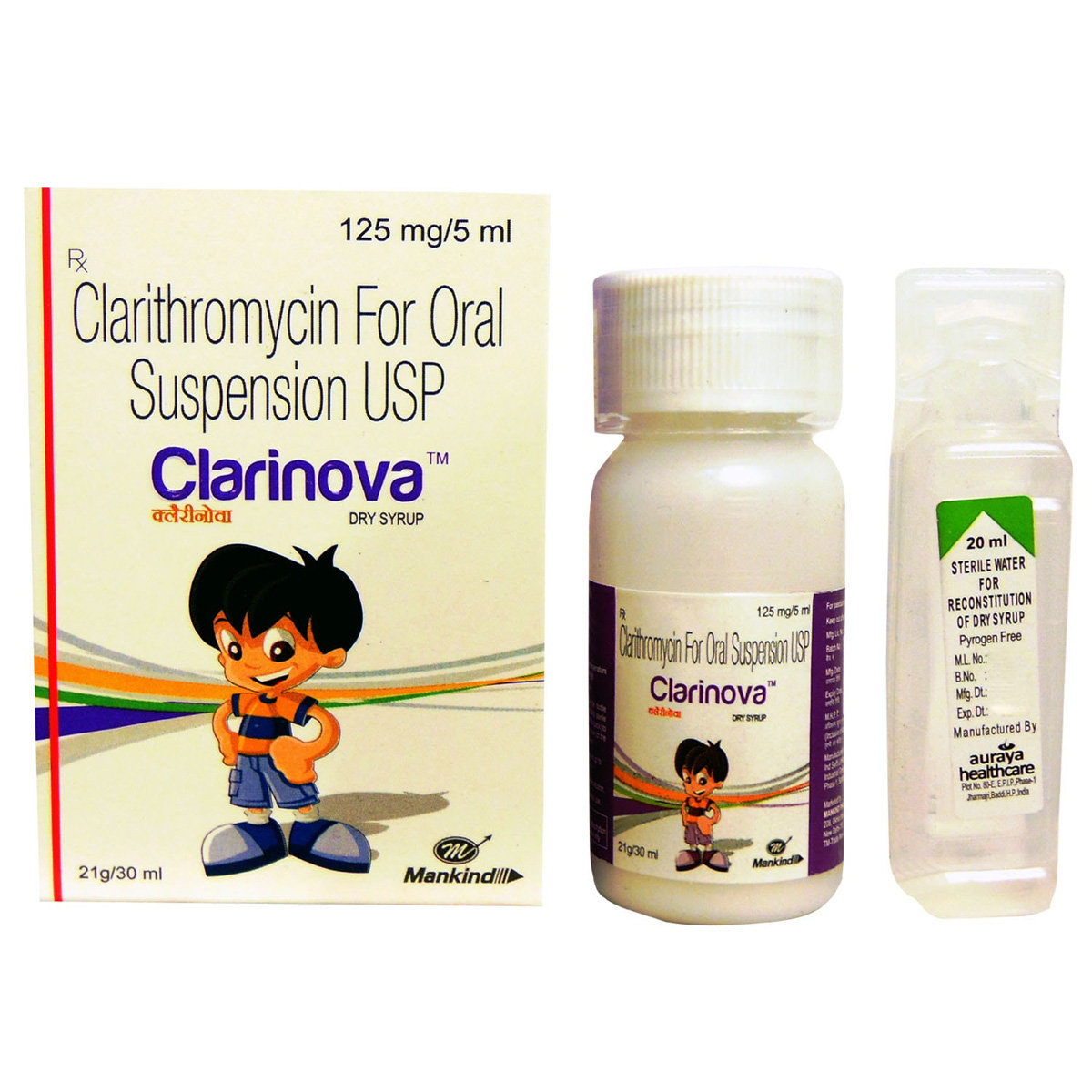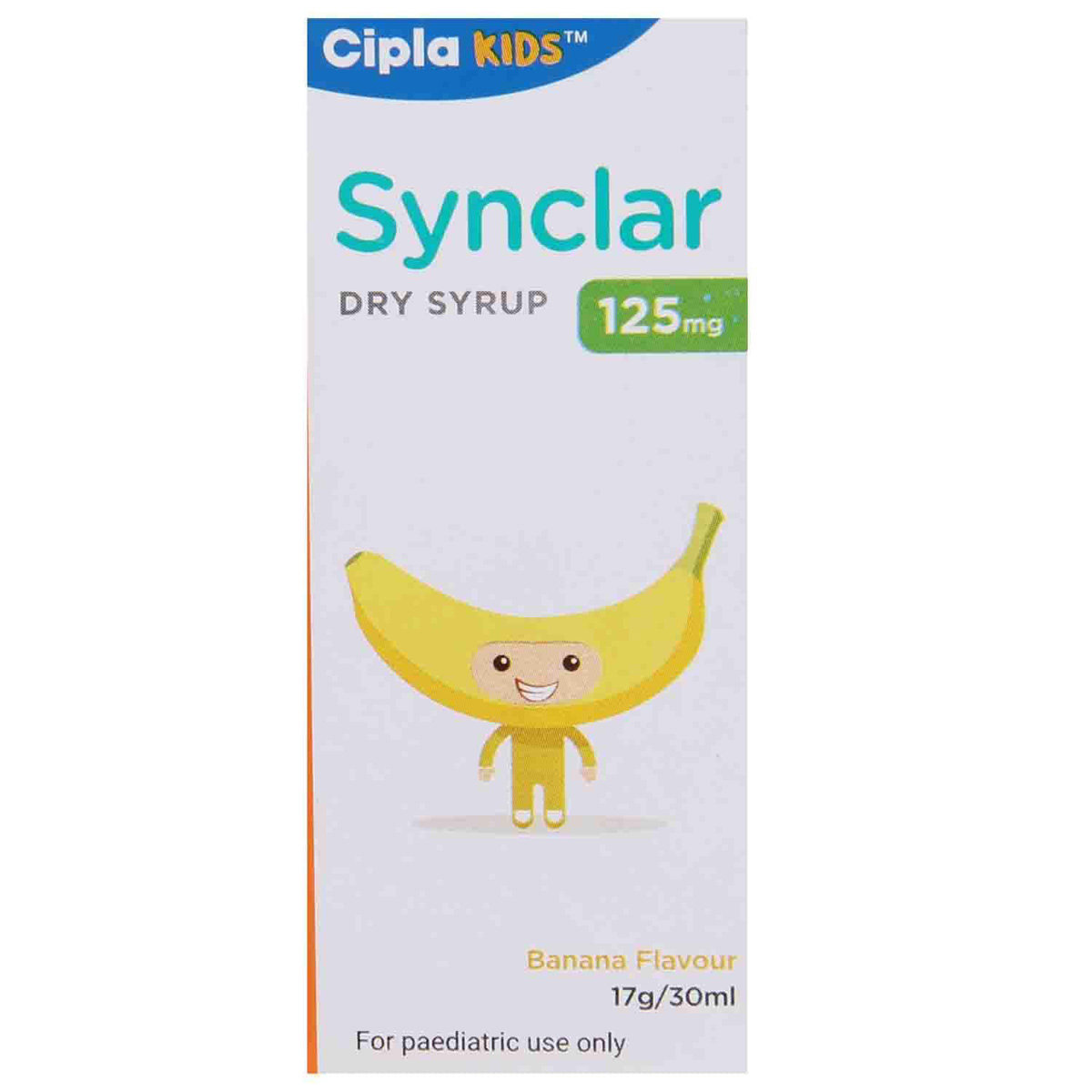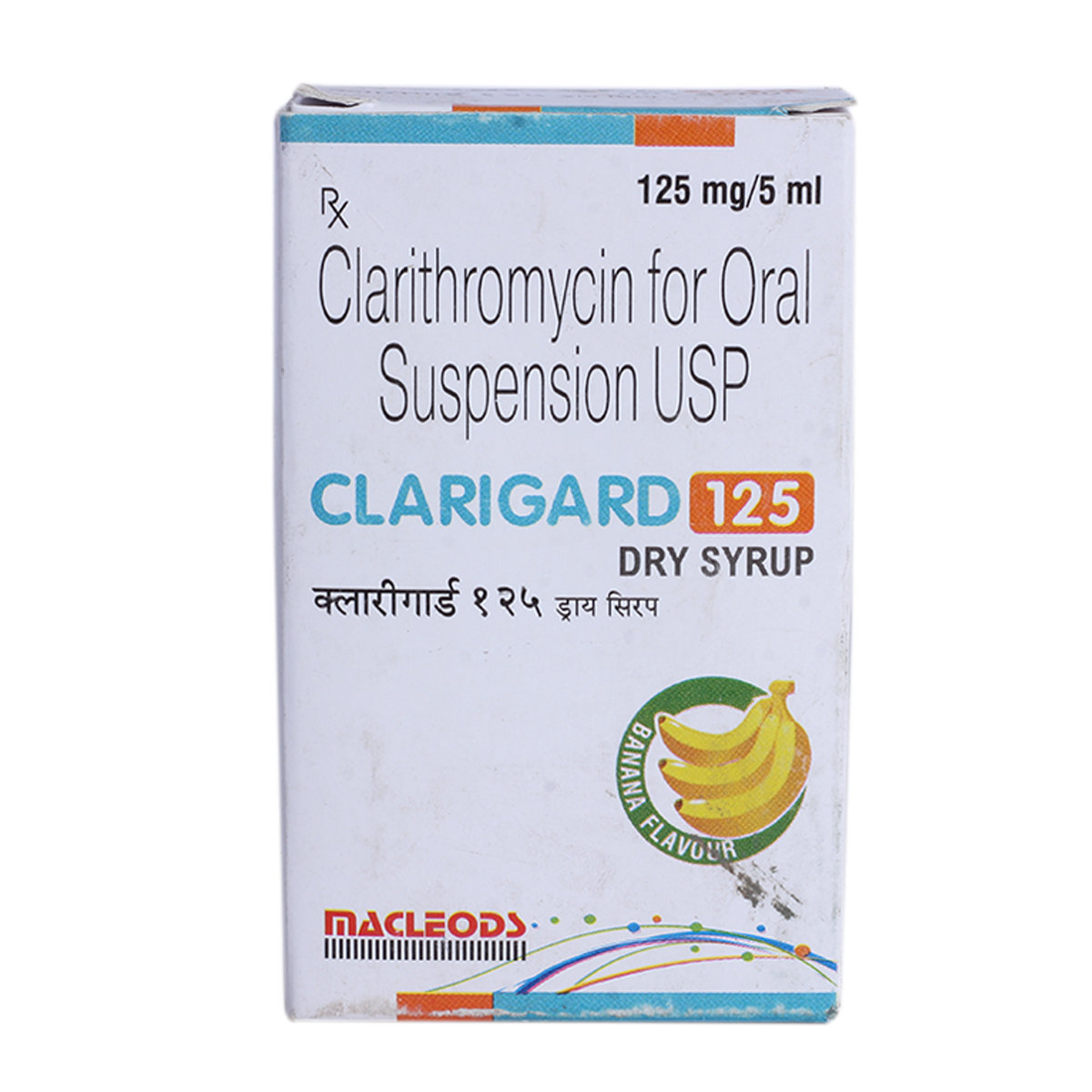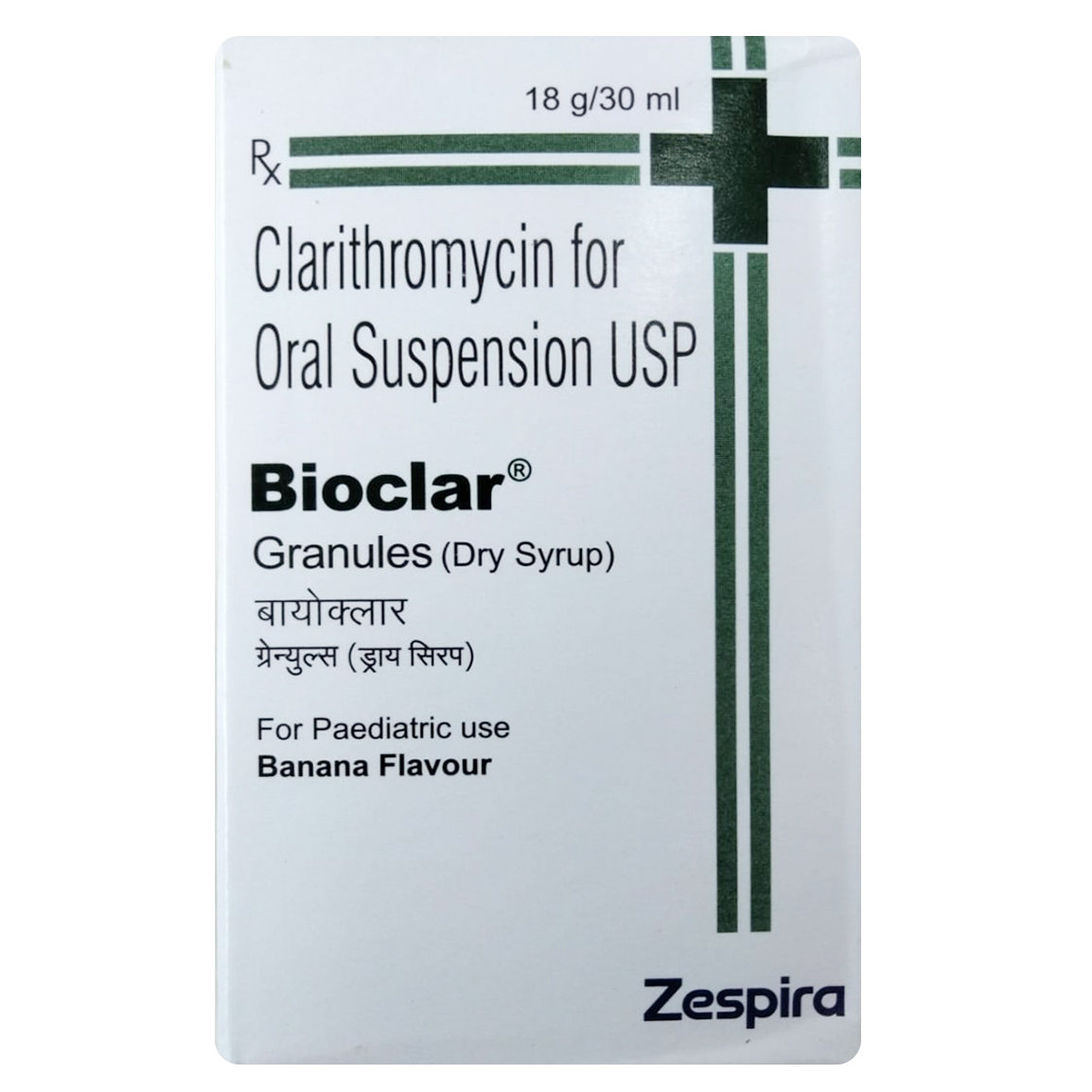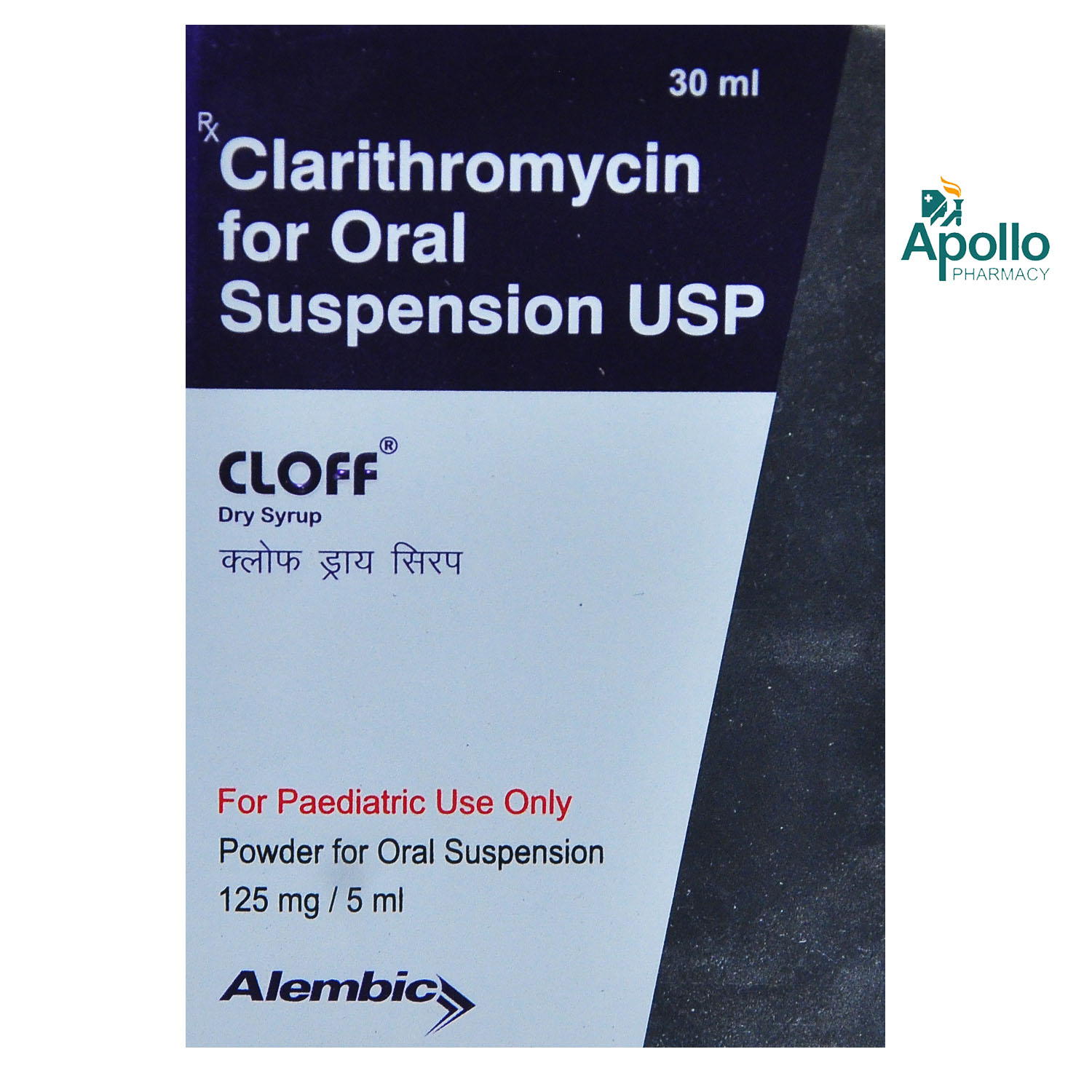- Home
- CLR Dry Syrup
CLR Dry Syrup Substitute
CLR Dry Syrup Substitute
Medicine Composition:
CLARITHROMYCIN-125MGAll Substitutes & Brand Comparisons
RX
Out of StockAliclair 125mg Dry Syrup
Leeford Healthcare Ltd
₹60
(₹1.8/ 1ml)
33% CHEAPERRX
Out of StockClarixl 125mg Dry Syrup
Fibovil Pharmaceuticals Pvt Ltd
₹76
(₹2.28/ 1ml)
15% CHEAPERRX
Out of StockClarsaf Syrup
₹118
(₹3.54/ 1ml)
31% COSTLIERRX
Out of StockAlbiclat 125mg Dry Syrup
₹125
(₹3.75/ 1ml)
38% COSTLIERRX
Out of StockClarixon 125 Dry Syrup Orange
₹130
(₹3.9/ 1ml)
44% COSTLIERRX
Out of StockAlclar 125mg Dry Syrup
₹139.5
(₹4.19/ 1ml)
55% COSTLIERRX
Clarinova Dry Syrup 30 ml
Mankind Pharma Pvt Ltd
₹147
(₹4.31/ 1ml)
59% COSTLIERRX
Out of StockClarotic 125mg Syrup
Werke Healthcare
₹144
(₹4.32/ 1ml)
59% COSTLIERRX
Synclar 125 mg Banana Flavour Dry Syrup 30 ml
Cipla Ltd
₹145
(₹4.35/ 1ml)
61% COSTLIERRX
Clarigard 125 Banana Dry Syrup 30 ml
Macleods Pharmaceuticals Ltd
₹147.5
(₹4.43/ 1ml)
64% COSTLIERRX
Bioclar Dry Syrup 30 ml
Cadila Pharmaceuticals Ltd
₹148.5
(₹4.46/ 1ml)
65% COSTLIERRX
Cloff Dry Syrup 30 ml
Alembic Pharmaceuticals Ltd
₹148.5
(₹4.46/ 1ml)
65% COSTLIERRX
CLARICIN DRY SYRUP
Icarus Health Care Pvt Ltd
₹148.5
(₹4.46/ 1ml)
65% COSTLIERRX
Clariwin Dry Syrup 30 ml
Micro Labs Ltd
₹148.5
(₹4.46/ 1ml)
65% COSTLIERRX
Out of StockAlclar-125 Dry Syrup 30 ml
Fawn Incorporation
₹138
(₹4.6/ 1ml)
70% COSTLIER

When Should You Consider Switching from CLR Dry Syrup?
Patients may explore substitutes in the following scenarios:
- High monthly cost of CLR Dry Syrup
- Non-availability in local pharmacies
- Generic recommendation by a doctor
- Side effects or better tolerability with alternatives
What to Know Before Switching
Before you switch from CLR Dry Syrup to another medicine, here are some important points to keep in mind:
Same salt, different brands:
Most substitutes contain the same active ingredient - CLARITHROMYCIN-125MG, but the fillers, coating, or manufacturing quality may vary slightly.
Consult your doctor first:
Even if the salt is the same, your doctor can confirm if the substitute is right for your condition, dosage, and health history.
Watch out for allergies or reactions:
Some people may react differently to certain brands due to inactive ingredients. If you notice any side effects, inform your doctor immediately.
Price ≠ effectiveness:
A lower-priced substitute doesn't mean it's less effective. Many generic medicines work just as well as branded ones.
Check the dosage form and strength:
Always match the substitute’s strength (e.g., 5mg, 10mg) and form (tablet, capsule, syrup) with what your doctor prescribed.
Uses
CLR Dry Syrup is used in the treatment of Bacterial infections. The detailed uses of CLR Dry Syrup are as follows:
- Treatment of Respiratory Infections: CLR Dry Syrup is commonly prescribed to treat respiratory infections such as bronchitis and pneumonia caused by susceptible bacteria.
- Skin Infections: CLR Dry Syrup effectively treats skin infections like cellulitis or impetigo, caused by bacterial pathogens.
- Sinusitis: CLR Dry Syrup is used to manage acute bacterial sinusitis, relieving symptoms like nasal congestion and facial pain caused by bacterial infections.
- Otitis Media: CLR Dry Syrup is frequently utilised to treat middle ear infections (otitis media), providing relief from ear pain and inflammation.
Medicinal Benefits
- CLR Dry Syrup is a macrolide class antibiotic used to treat a wide range of bacterial infections.
- It is effective against both gram-positive and gram-negative bacteria, certain anaerobic organisms, and some parasites such as Balantidium coli and Entamoeba species.
- It is commonly prescribed for chest and lung infections like bronchitis and pneumonia.
- It helps treat bacterial skin infections such as cellulitis.
- It is beneficial in treating middle ear infections and throat infections caused by susceptible bacteria.
- When used in combination with other drugs, CLR Dry Syrup aids in eradicating Helicobacter pylori, the bacteria responsible for duodenal ulcers.
- By stopping the growth and multiplication of bacteria, CLR Dry Syrup helps clear infections and promotes faster recovery.
FAQs
The substitutes of CLR Dry Syrup contain the same active salt(s) - CLARITHROMYCIN-125MG. However, they may differ in price, manufacturing quality, and inactive ingredients. Speak to your doctor to find a suitable option.
Switching to a generic substitute medicine in the place of CLR Dry Syrup is often possible if it has the same salt, strength, and dosage form. But always check with your doctor before making any changes to your medication.
Generics versions of CLR Dry Syrup are typically more affordable because they don’t include the original brand's research, development, and marketing costs. They contain the same active ingredient and are approved for safety and effectiveness.
Most people don’t notice any difference. However, some may react to different fillers or coatings. If you notice any unusual symptoms after switching, consult your doctor.
Make sure the new medicine has the same active salt, strength, dosage form. Always confirm the change with your doctor or pharmacist.
Substitutes of CLR Dry Syrup meet the same safety and efficacy standards as CLR Dry Syrup, but small differences in absorption or formulation can exist. A doctor can help you choose the right one for your needs.
Yes. Substitutes of CLR Dry Syrup may vary in color, size, or shape due to differences in manufacturing and branding, but this does not affect how they work.
Yes, it’s generally safe to switch between multiple substitutes of CLR Dry Syrup if they have the same salt and strength. However, always inform your doctor so they can monitor how your body responds.
Yes, many people safely use substitutes of CLR Dry Syrup for long-term treatment. Just ensure it’s done under medical supervision.
If your symptoms stay under control or lab results remain stable, the substitute for CLR Dry Syrup is likely working well. Regular follow-ups with your doctor are important.
Absolutely. Even with the same salt, small differences can affect how your body responds when switching from CLR Dry Syrup to its substitute. Always consult your doctor before switching.
CLR Dry Syrup is used to treat bacterial infections, including chest infections, skin infections, and ear infections. Besides this, CLR Dry Syrup is also used in combination with other medicines to treat duodenal ulcers caused by H. pylori.
CLR Dry Syrup contains Clarithromycin (antibiotic). It inhibits the protein synthesis process required for the growth of the bacterial cell. As a result, bacterial cells are not able to reproduce and grow. Thus, CLR Dry Syrup helps in the prevention of infections.
You should avoid taking iron supplements, multivitamins, calcium supplements, antacids, or laxatives within 2 hours before or after taking CLR Dry Syrup. Avoid taking any other antibiotics containing CLR Dry Syrup unless your doctor has prescribed you.
After taking antibiotics such as CLR Dry Syrup, some people get thrush, a fungal infection. This is due to the fact that antibiotics kill the regular, harmless bacteria that serve to protect you from thrush.
CLR Dry Syrup treats only bacterial infections. It will not work for viral infections (such as the common cold, flu).
No, CLR Dry Syrup is a macrolide antibiotic. It can be taken by people who are allergic to penicillin with a doctor's advice only.
Side effects are rare with CLR Dry Syrup and do not usually last long. They will get better after a day or two. If any side effects persist, reach out to the doctor immediately.
No, CLR Dry Syrup should not be stopped even if you feel better, as it is an antibiotic medication and completing the full course is very necessary; otherwise, the infection might reappear in a more severe form.


